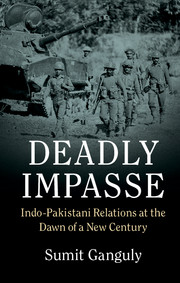Book contents
- Frontmatter
- Dedication
- Contents
- List of maps
- Preface and acknowledgments
- List of abbreviations
- 1 The rivalry revisited
- 2 Kargil and after
- 3 The troubled decade in Kashmir
- 4 The road to Operation Parakram
- 5 The composite dialogue and beyond
- 6 An extension of the rivalry
- 7 Policy implications
- In lieu of an epilogue
- Appendices
- References
- Index
4 - The road to Operation Parakram
Published online by Cambridge University Press: 05 March 2016
- Frontmatter
- Dedication
- Contents
- List of maps
- Preface and acknowledgments
- List of abbreviations
- 1 The rivalry revisited
- 2 Kargil and after
- 3 The troubled decade in Kashmir
- 4 The road to Operation Parakram
- 5 The composite dialogue and beyond
- 6 An extension of the rivalry
- 7 Policy implications
- In lieu of an epilogue
- Appendices
- References
- Index
Summary
THE ROAD TO OPERATION PARAKRAM AND AFTER
Chapter 2 explored in some detail how the Kargil conflict had undermined the limited trust that the Lahore peace process had engendered. It also showed that the fragmented structure of political authority within Pakistan placed the understandings reached at Lahore in jeopardy. In effect, Nawaz had been incapable of making a “credible commitment” because the military establishment was not in accord with his interest in seeking a rapprochement with India. Subsequently, despite Prime Minister Vajpayee's efforts to continue a dialogue with Pakistan, the Agra Summit fell apart. This time both Musharraf's rigidity on issues pertaining to the Kashmir dispute and the Indian Deputy Prime Minister's Lal Krishna Advani's insistence on the inclusion of language dealing with Pakistan's willingness to end its support for terror contributed to the impasse.
This chapter will examine how, as a consequence of a Pakistan-based terrorist attack, the bilateral relationship took a substantial turn for the worse. Thanks to Pakistan's possession of nuclear weapons, the unavailability of any viable pre-planned conventional military options for a swift and calibrated reprisal, and persistent American diplomatic pressures to refrain from any precipitate military action prevented India from launching a conventional attack on Pakistan. Instead it resorted to a strategy of coercive diplomacy to try and induce Pakistan to end its support for terror. As this chapter will show, there were distinct limits to India's ability to induce Pakistan to make any significant commitment to terminate its dalliance with terror. In this context, it is important to reiterate the central argument of this book. The strategic imperatives of the military order in Pakistan made it impervious to external pressures to abandon its intransigence toward India.
It will also argue that Pakistan, under military pressure from India, and diplomatic prodding from the United States, did undertake some measures to curb its support for the use of terror as part of its asymmetric war strategy against India. However, it evinced no willingness to eschew that strategy. Instead it merely curbed the activities of various groups and organizations that it had nurtured and supported to pursue its strategic goals against India.
This leads to the conclusion that it was not India's military acquisitions, force postures or deployment choices that prodded Pakistan to undertake risky proxy war strategies against India.
- Type
- Chapter
- Information
- Deadly ImpasseIndo-Pakistani Relations at the Dawn of a New Century, pp. 63 - 80Publisher: Cambridge University PressPrint publication year: 2016

